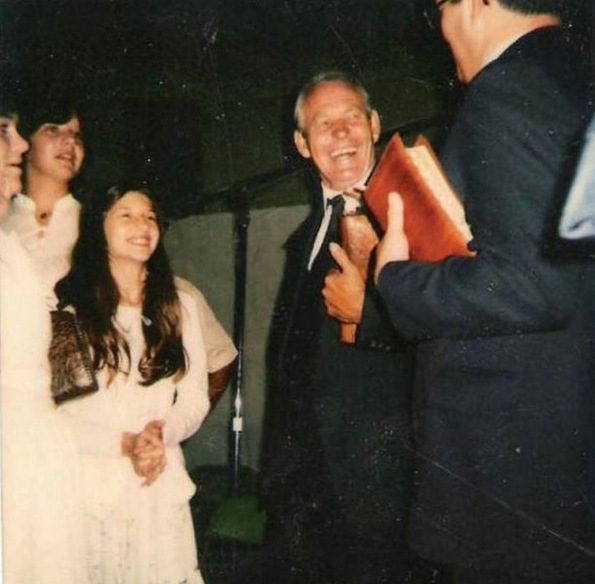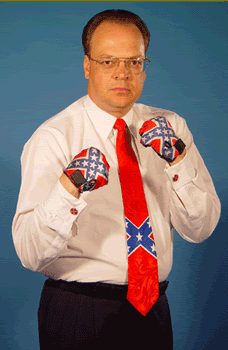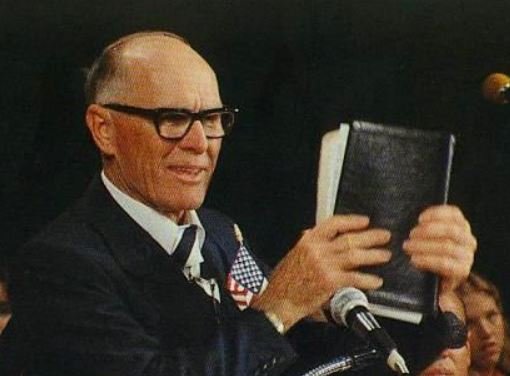
As many of you know, I have long been an advocate for those abused at Independent Fundamentalist Baptist (IFB) teen group homes (re-education camps). These homes, some of which are still in existence, routinely used violence to force teenagers into “Biblical” submission. Some of the residents were sexually violated. Where was the state, you ask? Sitting on the sidelines, often ignoring the cries of those beaten, abused, sexually molested, and raped.
One such home was the New Bethany Home for Girls, owned and operated by IFB preacher Mack Ford. Ford, who died February 11, 2015, was a protégé of famed abuser Lester Roloff. The New Orleans Times-Picayune published numerous articles about New Bethany. Unfortunately, many of these stories are no longer available.
Over the years, the victims of Mack Ford and the staff at New Bethany have tried to bring their abusers to justice. Unfortunately, Ford wore a Teflon suit, and nothing seemed to stick to him. Weeks before he died, a grand jury declined to charge 82-year-old Mack Ford.
Rebecca Catalanello, in a Times-Picayune feature article, had this to say (link no longer active):
A grand jury has declined to indict a man accused of raping girls who were under his care at a notorious religious boarding school in north Louisiana decades earlier.
Mack W. Ford, 82, of Arcadia, was the target of what law enforcement officials describe as a year-long investigation into reports he molested young residents at his now-shuttered New Bethany Home for Girls.
A written statement released Tuesday (Jan. 6) by Bienville Parish District Attorney Jonathan Stewart, said “the grand jury was given research and information regarding the statute of limitations with regard to each alleged act and, after deliberation, returned a no true bill.” A no true bill represents a grand jury’s decision not to indict.
Three women who lived at the home in the 1970s, 1980s and 1990s traveled from three states to testify before a grand jury Dec. 18 about their experiences with Ford. Other witnesses testified Oct. 15 and Dec. 29, according to state officials.
The women said their grand jury testimony was the closest they felt they had come to achieving justice for the crimes they said were committed against them as young girls in the place Ford once described as “a mission project to the incorrigible, unwanted rejects.” But after a Louisiana State Police investigator notified them by phone Monday evening that Ford would not face charges, the former residents sounded variously dazed, outraged and despondent.
“If he had been indicted for just one thing, it would have been justice for so many people,” said Simone Jones, a 47-year-old police dispatcher in Kansas who told police that Ford raped her in 1982 or 1983. “Why does this man continue to walk free?”
The grand jury convened almost exactly a year after Jones and other former residents journeyed to Bienville Parish to support Jennifer Halter, an ailing woman from Las Vegas, as she fulfilled a dying wish to report Ford, who she said began molesting her shortly after she arrived at the school in 1988 until her 1990 departure. Their trip was documented in an April NOLA.com | The Times-Picayune series that chronicled decades of abuse allegations at the home for which no one was ever prosecuted.
Ford, who still resides at the former New Bethany compound at 120 Hiser Road, has declined to comment about the allegations against him. He could not be reached by phone Tuesday morning, nor could Jesse Lewis Knighten, a nephew who court records show assumed power of attorney for Ford in January 2013.
Halter and Jones said that Mike Epps, an investigator with Louisiana State Police, told them Monday evening that the grand jury decided that the crimes they described were not prosecutable under current law.
“The reason given in the short-term was not that the grand jury didn’t believe us. It was because of the statutes,” Jones said.
Jones told police she was 14 when Ford approached her while she was doing chores, asked her if she was “a pure lady,” unbuttoned his overalls and then forced her to perform oral sex.
Jones said that Epps explained to her Monday that though current law considers oral sexual intercourse to rise to the level of “forcible rape” in some circumstances, at the time she said she was victimized in the early 1980s, the law only considered it “oral sexual battery.” Forcible rape has no statute of limitations, while sexual battery does.
“They let us down again,” Halter said. “I can’t understand why it’s OK for these people to do what they do and walk away like nothing was done wrong. It’s like laughing in our face all over again. What is justice? When is enough enough?”
Halter told police that Ford was chief among her abusers during her time at the home. In interviews with NOLA.com | The Times-Picayune, she described repeated abuse, including frequent sexual contact by Ford during choir trips he chaperoned to churches in nearby towns and states — information she said she also reported to police in 2013.
Louisiana State Police Capt. Doug Cain said Epps would not be able to discuss the investigation or the grand jury’s decision. “We have to respect the court’s decision,” Cain said.
Former residents who were aware of the latest police investigation, recalled decades of abuse allegations recorded by state social workers and local police that never materialized in criminal charges.
“This has gone on for years,” said Tara Cummings, a resident at the home from 1982 to 1983. She said that if the statute of limitations was an issue, the state attorney should not have convened a grand jury to begin with…
…Ford created New Bethany Home for Girls 44 years ago on a plot of land 50 miles east of Shreveport, on more than six acres he bought for $30,000 from a 60-year-old widow, according to court records. The site had served as a penal farm and later a nursing home before he turned it into a home for what he called “wayward” girls.
New Bethany was affiliated with the Independent Fundamentalist Baptist church. Residents were subject to strict rules, harsh punishment and maintained restricted access to the outside world, according to interviews, news reports and legal documents.
“We are reaching out as a mission project to the incorrigible, unwanted rejects,” Ford told attorneys in a 1997 court deposition. “Destitute, lonely, prostitutes, drug addicts … These kids haven’t been loved and they haven’t had a chance in life.”
Ford was a high school dropout-turned-tire-salesman who said he was inspired to open the school during a retreat in Arkansas. There, he once said in a court deposition, he met two little blonde 12-year-old girls who had been impregnated by their father and was inspired to help such troubled children.
Until its closure in 2001, the school took in hundreds of children and young women from across the state and country.
To some who heard of New Bethany’s mission and others who encountered the school through its traveling girls’ choir it appeared a worthy charitable cause. But records, interviews, news reports and other documents show residents also went to extraordinary lengths to escape the home.
Stories of physical and mental abuse plagued New Bethany for almost as long as it was open, documents and news stories show. Girls who ran away from the school described brutal paddlings and harsh physical punishment. They were rarely allowed to call home and when they did, their calls were monitored, according to accounts.
Runaways often scaled the tall chain-link fence, crawling over the inward facing barbed wire at the top, and ran through dense woods to find someone who might believe them.
State and local officials escorted girls from the property during several raids. But the home was repeatedly allowed to reopen and reenroll children.
Ford became known for his resistance to outside interference. He filed federal civil rights lawsuits twice after state officials from child protective services and the state fire marshal sought to inspect the facility or question children and staff about their complaints of abuse. A federal judge in 1992 dismissed a lawsuit in which Ford asked the government to keep officials from interfering in New Bethany operations. Seven years later, the 5th U.S. Circuit Court of Appeals upheld a lower court decision determining there was no evidence that state officials were plotting to shut down New Bethany, as Ford complained…
…Joanna Wright, 54, of Houston, sounded tired when she spoke about the grand jury decision this week.
Wright, a preacher’s daughter, arrived at the home in the mid-1970s at age 14, excited for an experience outside what she describes as her insular, fundamentalist upbringing. But she said Ford soon began molesting her and, in 1977, forcibly raped her on the New Bethany compound.
Wright said news of the non-indictment left her feeling numb. She said she had told authorities about what happened to her on several occasions — she said she told a social worker about it in 1993 and spoke to a district attorney in 1998 — and nothing ever came of it.
But in July 2013, haunted and frustrated by her experience and the experiences of those she knows, Wright reached out to Jump, the assistant district attorney in Bienville Parish, and told her she was ready to make a police report in person.
On July 11, 2013, Jump wrote back:
“We are a long way from being able to arrest him. I have to sift through this stuff and talk to someone who was raped at the home and is willing to testify to that fact. And then determine if I can win the case. I don’t think it would be good for anyone [sic] of the victims to go through with what it would take to convict him if we can’t convict him. I will do my best and anything within my power to see that justice is done. But unfortunately justice for some of the victims will not be served on this earth. He will have to answer to God.”
I am personal friends with a handful of the women who were incarcerated (and I mean incarcerated — against their will) at New Bethany. I know from talking to them that their time at Ford’s group home left deep, horrible, lasting scars.
Mother Jones published several articles about New Bethany Home for Girls: Survivor Snapshots From Teen-Home Hell and Horror Stories from Tough-Love Teen Home — both written by Katheryn Joyce.
Victimized No More is a great repository of information about Mack Ford and New Bethany. Sadly, many of its links are broken due to the Times-Picayune removing (or moving) Mack Ford and New Bethany stories from its site.
Times-Picayune articles:
New Bethany Home for Girls endured 30 years of controversy, leaving former residents wondering why
New Bethany Home for Girls: Timeline
Previous posts about Mack Ford and New Bethany Home for Girls
Teen Group Homes: Dear IFB Pastor, It’s Time for You to Atone for Your Sin
The Dogma that Followed Me Home by Cat Givens
Bruce Gerencser, 66, lives in rural Northwest Ohio with his wife of 45 years. He and his wife have six grown children and thirteen grandchildren. Bruce pastored Evangelical churches for twenty-five years in Ohio, Texas, and Michigan. Bruce left the ministry in 2005, and in 2008 he left Christianity. Bruce is now a humanist and an atheist.
Connect with me on social media:
Your comments are welcome and appreciated. All first-time comments are moderated. Please read the commenting rules before commenting.
You can email Bruce via the Contact Form.









